#HistoryoftheBBC
Explore tagged Tumblr posts
Text
History of the BBC: From its Beginnings to the Present Day
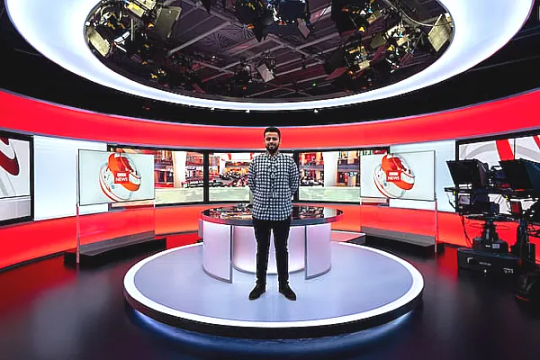
The British Broadcasting Corporation (BBC) is a public service broadcaster that was founded in 1922. Its mission is to inform, educate, and entertain. The BBC is the world's oldest national broadcasting organization and the largest broadcaster in the world by the number of employees.
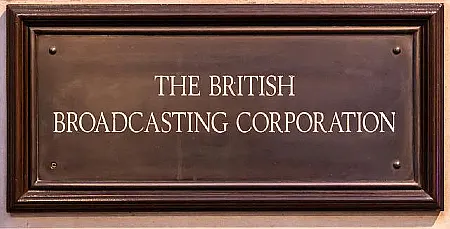
The BBC copper plaque. Image by TheOtherKev. Pixabay.
The BBC's Founding and Mission
The BBC employs over 31,000 staff in total, including more than 2,000 journalists. The BBC functions under a Royal Charter and finances itself through a license fee imposed on all UK households owning a television. A group of private individuals, driven by the desire to establish a radio station benefiting the public, founded the BBC. The inaugural broadcast occurred on November 2, 1936, from North London's Alexandra Palace (Ally Pally) and lasted for one hour. It started with the time and weather then a current British Movietone News film and finished with as the Radio Times described it "Variety". The BBC has come a long way since its humble beginnings and is now one of the most respected news organizations in the world.
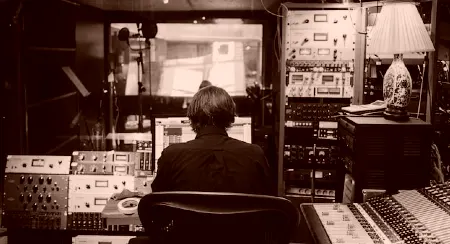
Radio studio. Photo by John Hult. Unsplash.
The 1920s: The BBC's Early Years
The BBC's first years were marked by growth and expansion. In 1924, the BBC launched its first radio news bulletin but it wasn't until 1927 that the BBC launched its first regular radio service. The BBC's early years were also marked by controversy. In 1926, the BBC's Scottish founder Sir John Charles Walsham Reith came under fire for the BBC's radio coverage of the 9-day General Strike. Winston Churchill (at that time the Chancellor of the Exchequer) tried to put pressure on Reith to announce the government's point of view but Reith held firm. The British prime minister (Baldwin) had a series of conversations with Reith but he held firm with his view of being impartial. Labor party leaders were also very upset by the lack of coverage after their leader Ramsay MacDonald was refused radio airtime. The first official launch of the Radio Times was in September 1923. The magazine listed all the radio shows by the days of the week with the times they were to air. In January 1927 by the Royal Charter, the BBC was officially established. Sir John Reith became the first Director-General. The founding charter defined the BBC's official objectives, powers, and obligations. In November 1929 the Scottish inventor Sir John Logie Baird started to test his vision frequencies theories for the BBC. His experimental television broadcasts started from studios near Covent Garden in London. With only 30 lines of black and white definition, the images were very basic.
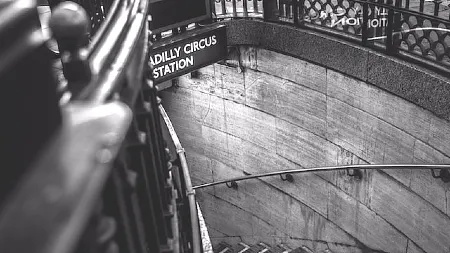
London Blitz shelter. Photo by Hat Creative. Unsplash.
The 1930s and 1940s: The BBC and World War II
The BBC has a long and complicated history, especially when it comes to World War 2. After the outbreak of war in 1939, the BBC was used as a propaganda tool by the government to ensure that the public had accurate information about the war effort. This meant that the BBC had to walk a fine line between being objective and serving the government's agenda. The BBC did an admirable job during the war, but it was not without its controversies. One such controversy was the decision to broadcast Lord Haw's Nazi propaganda speeches. Despite this, the BBC remained an important part of British life throughout the war and continues to be so today. After the end of World War 2, Lord Haw was returned to England and later hanged for treason.
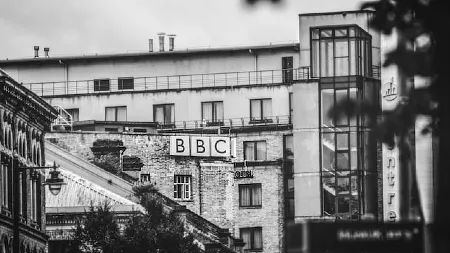
Belfast Offices. Photo by K Mitch Hodge. Unsplash.
The 1950s-1960s: The BBC's Golden Age
The BBC's Golden Age is considered to be the 1950s and 1960s. This was a time when the BBC was at the forefront of British broadcasting. The BBC had a monopoly on television in the UK and was able to produce some of the finest media in the world. The BBC's output during this period was hugely influential and set the standard for other broadcasters to follow. The likes of David Attenborough, Kenneth Clark, and Alistair Cooke were all household names thanks to the BBC. This was also a time when the BBC began to expand its reach beyond Britain. The launch of Radio 1 in 1967 saw the BBC become a truly global broadcaster. The BBC's reputation for quality and impartiality was cemented during this period and it remains one of the most respected broadcasters in the world today.
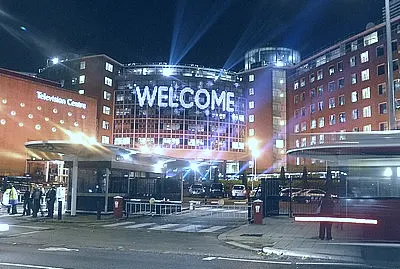
BBC Television Center, Wood Lane. Photo by Mike Fleming. Flickr.
The 1970s-1980s: The BBC in Crisis
The BBC is one of the most respected broadcasters in the world, but it has not always been easy sailing. In the 1970s and 1980s, the BBC was in crisis, facing challenges from all sides including internal power struggles. From within, the BBC was beset by industrial action as staff went on strike over pay and conditions. This led to a decline in morale and a loss of public trust. The BBC was also criticized for its coverage of events such as the Falklands War and the miners' strike. Outside of the organization, the BBC faced competition from commercial broadcasters who were eroding its market share. The government also introduced policies that threatened the independence of the BBC, such as introducing advertising on Radio 1. Despite these challenges, the BBC remained a powerful force in British life throughout this period.
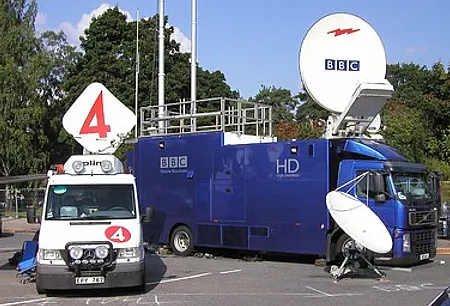
Outside broadcasting crew. Photo by Timo W2S, Unsplash.
The 1990s-2000s: The BBC in the Digital Age
The 1990s and 2000s were a time of change for the BBC. The broadcaster became more commercial, launching several new channels and services. At the same time, it began to embrace digital technology, making its content available online and on demand. The BBC has a long and proud history of public service broadcasting. However, in the 1990s, it faced increased competition from commercial broadcasters. In response, the BBC launched several new channels, including BBC2, BBC News 24, and Radio 5 Live. It also began to make its content available online and on demand. Digital technology has transformed the way we consume media. And the BBC has been at the forefront of this change. Today, millions of people around the world can access its content on their computers, phones, and tablets.
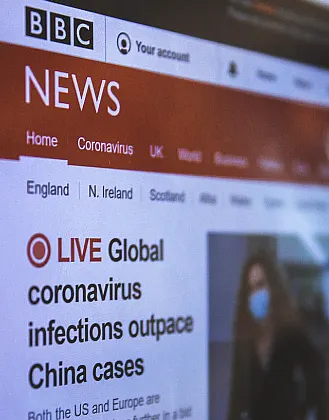
BBC website. Photo by Siora Photography. Unsplash.
In Conclusion
The British Broadcasting Corporation (BBC) has a rich and storied history that spans nearly a century. From its modest beginnings in 1922 as a radio station with a mission to inform, educate, and entertain, the BBC has evolved into a global media powerhouse. The BBC has marked its journey through the decades with growth, challenges, and pivotal moments that have shaped its role in the United Kingdom and beyond. The BBC's early years showcased innovation and controversy, but the organization unwaveringly committed to impartiality and dedicated itself to serving the public good. Throughout World War II, the BBC played a crucial role in disseminating information while skillfully navigating the complex terrain of wartime propaganda. The 1950s and 1960s often refer to the BBC's Golden Age, a period during which it dominated British broadcasting and established international standards for quality and impartiality. The BBC's celebrities like David Attenborough became household names during this era, and its influence extended globally with the launch of Radio 1. However, the 1970s and 1980s were challenging times for the BBC, marked by internal strife, external competition, and political pressures. Despite these hurdles, the BBC continued to play a significant role in British life, maintaining its status as a respected broadcaster. The 1990s and 2000s ushered in a new era for the BBC as it adapted to the digital age. Embracing technology and expanding its offerings, the BBC ensured that its content reached audiences through various digital platforms and channels. The BBC Today Today, the BBC remains a global media leader, upholding its mission to inform, educate, and entertain. With its commitment to impartiality, quality content, and adaptability to changing technologies, the BBC continues to be a vital source of news, information, and entertainment for audiences worldwide. As we reflect on the BBC's journey from its humble beginnings to its present-day prominence, we recognize the enduring impact of this public service broadcaster on the media landscape. Its ability to evolve and innovate while staying true to its core values is a testament to its enduring importance in the world of broadcasting. The BBC's legacy serves as a reminder of the power of responsible journalism, quality programming, and the enduring mission to serve the public interest. Sources: THX News, Wikipedia, The BBC & The BBC Archive. Read the full article
#BBC#BBCdigitaltransformation#BBCGoldenAge#BBChistory#BBCincrisis#BBC'senduringlegacy#BBC'sevolution#BBC'sglobalinfluence#Britishbroadcaster#Britishbroadcastingcorporation#HistoryoftheBBC#Publicservicebroadcasting#WorldWarIIBBC
0 notes
Link
Updated link, bunch of similar ones there too but it's about halfway down https://www.bbc.com/historyofthebbc/100-voices/people-nation-empire/lgbtq/
anything that contains the phrase “secret BBC memo reveals” intrigues me automatically ngl but I want you all to know that as far as I can gather, the facts are even better than this headline
which is to say, this was part of an initiative in the early 1970s that not only featured marginalized groups on BBC programming, but made moves towards handing them editorial control – the BBC had to approve proposals, but after that, the station’s role was primarily to provide technical resources, facilities, and copyright handling. (another notable program under this initiative featured Black teachers discussing racism in the school system, and a link to that – plus discussion of the hurdles it faced – can be found here).
the program on trans experience was aired in 1973.
The programme, featuring trans women, began: “Jokes about ‘the operation’ are all that most people know about transexualism [sic]. Tonight’s group discuss their situation in a more serious and comprehensive way, and draw attention to the many difficulties they endure”.
you can watch Open Door: Transex Liberation Group here (as well as other archived LGBTQ programming from BBC).
89K notes
·
View notes
Text
The 1990s
A brief guide to the politics, music, television, and cinema that defined the decade
If you’re old enough to remember them, this is the website for you. If you are too young to remember them then this is also the website for you; a guide to the politics, music, television, film and fashion that shaped the United Kingdom and the world in the 1990s containing links to websites and documentaries.

(Former US President Bill Clinton, the birth of the internet, the Super Nintendo, these will all bring back memories for you if you remember the 1990s! If not, this is what it was like! Picture courtesy of the New York Times)
Politics

(Tony Blair, UK Prime Minister 1997 – 2007, standing outside No.10 having won the general election of May 1997, picture courtesy of Talk Radio website)
It was a decade that began with Margaret Thatcher in No.10 Downing Street and ended with Tony Blair, while in the United States by the end of the decade President George HW Bush had been replaced in the White house by Bill Clinton. This reflected passing of the torch from a generation shaped by World War II to that of the baby boomer generation born after it. What happened in between, from Thatcher’s downfall in 1990 through to the subsequent succession of John Major and election of victory of 1992 and the defeat of 1997 are shown all in the links below.
·YouTube links to the general election of 1992 - https://www.youtube.com/watch?v=p4YY7KWJAtA&t=2s
and of 1997 – https://www.youtube.com/watch?v=XoL_tT046tI
YouTube links to the Gulf War of 1991 - https://www.youtube.com/watch?v=8zQT5WB_nHE&t=1404s
Documentary about the Clinton years - https://www.youtube.com/watch?v=pGIpEURVn2c
Documentary series about the Major years – https://www.youtube.com/watch?v=8e4UZaMgIxE&t=160s https://www.youtube.com/watch?v=bee71Ersv1o&t=89s https://www.youtube.com/watch?v=k2akS9uLkCk
Music

(Oasis at Knebworth 1996 picture courtesy of NME)
It began with the Stone Roses at Spike Island with Stock, Aitken and Waterman dominating the charts; it finished with Steps and B*witched. What happened it between (Grunge, Britpop, Trip-hop, Dance, Girl Power are explained in the links below.
List of 1990s UK No.1 Singles - https://en.wikipedia.org/wiki/List_of_UK_Singles_Chart_number_ones_of_the_1990s
List of 1990s UK No. 1 Albums - https://en.wikipedia.org/wiki/List_of_UK_Albums_Chart_number_ones_of_the_1990s
Live Forever; The Rise of Britpop documentary (strong language) – https://vimeo.com/channels/366281/46153236
Spice Girls documentary - https://www.youtube.com/watch?v=mWbuFGNYx5U
Nirvana documentary - https://www.youtube.com/watch?v=3dg96TdaQ94
Oasis documentary Supersonic (strong language, as you can imagine!) http://www.documentarymania.com/player.php?title=Oasis%20Supersonic
Cinema

(Film posters of the 1990s, picture courtesy of Sporacle)
While it was films such as Titanic and Forest Gump that drew the most at the box office, it has to be remembered it wasn’t a bad decade for British cinema either! Having endured a fairly lame 1980s (in 1989, annual investment in film production was a meagre £104 million; by 1996, it stood at £741 million), hits such as Trainspotting, The Full Monty and The English Patient helped put British cinema on the map again.
List of the best British films from the 1990s - http://www.tasteofcinema.com/2014/the-15-best-british-films-of-the-1990s/
List of the best films from the 1990s - https://www.bfi.org.uk/news-opinion/news-bfi/lists/90-great-films-1990s
List of the highest grossing pictures - https://en.wikipedia.org/wiki/1990s_in_film
List of trailers - https://www.youtube.com/playlist?list=PLTT8GoH4BtdLaWW7hZS77IfFYwkWK-1Wc
Television

(Publicity shot of Friends, picture courtesy of Rotten Tomatoes)
In the US it was shows like the Simpsons, The X-Files and Friends that helped to define the era, the later show widely seen as defining the era in the same way that Cheers had done in the previous decade having bowed out in 1993.
The birth of lad culture and the rise magazines like Loaded was reflected in the popularity of the sitcom Men Behaving Badly but the girls could prove they could also be top of their game with Absolutely Fabulous.
By the end of the decade the panel show was in full swing with shows like NeverMind the Buzzcocks following in the footsteps of Have I Got News for You. In the world of soap opera the BBC launched Eldorado in 1992 but critical attacks and poor ratings led to its cancelation a year later. That decade would see EastEnders and Coronation Street battling for viewers.
Best TV shows of the 1990s - https://www.pastemagazine.com/tv/the-90-best-tv-shows-of-the-1990s/
Documentary about television in the US in the 1990s - https://www.youtube.com/watch?v=uYkutyMvMAc
Essay about American television in the 1990s - https://www.britannica.com/art/television-in-the-United-States/The-1990s-the-loss-of-shared-experience
Eldorado documentary - https://www.youtube.com/watch?v=T4yRYQmMsLU
History of the BBC in the 1990s - https://www.bbc.com/historyofthebbc/timelines/1990s
Fashion

(Picture courtesy of CNN)
Fashion in the 1990s was defined by a return to minimalist fashion and the rise of the supermodels, in contrast to the more elaborate and flashy trends of the previous decade.
In the early 1990s, several late 1980s fashions remained very stylish among both sexes. However, the popularity of grunge and alternative rock music helped bring the simple, unkempt grunge look to the mainstream by 1992. By 1994 this had all changed and grunge clothing rapidly declined as fashion became more feminine and form-fitting. Young women in the UK and America wore tailored skirt and trouser suits while men’s fashion was shaped by 1960s mod clothing and longer due to the success of Britpop. From the late 1990s onwards, American teenage girls imitated the look of British girl group All Saints, which consisted of baggy jeans, T-shirts, sweatshirts, tank tops, and trainers.
The anti-conformist approach to fashion led to the popularization of the casual chic look that included T-shirts, jeans, hoodies, and sneakers, a trend which continued into the 2000s. Additionally, fashion trends throughout the decade recycled styles from previous decades, notably the 1950s, 1960s and 1970s.
21 moments that defined 1990s fashion: -https://www.wmagazine.com/gallery/most-iconic-1990s-fashion-moments/
1990's Fashion History - The Mood of the Millennium https://www.fashion-era.com/the_1990s.htm
1990s fashion – A brief history of what we wore https://edition.cnn.com/style/article/1990s-fashion-history/index.html
THE ULTIMATE FASHION HISTORY 1990s https://www.youtube.com/watch?v=MOPcTZScYmk
The 20 Most Famous Supermodels of the '90s https://www.marieclaire.com/fashion/g2173/supermodels-of-the-90s/
1 note
·
View note
Photo

18/03/2022
Week 3 Socio Cultural
i really enjoyed researching this part of the 1930s as i didnt have a lot of prior knowledge.
https://www.scarleteen.com/birth_control_bingo_cervical_barriers
https://digitaldreamdoor.com/pages/best_songs-1930s.html
https://www.dagogo.com/real-billie-holiday-part-one-1930s/
https://www.dagogo.com/real-billie-holiday-part-one-1930s
https://www.bbc.com/historyofthebbc/100-voices/birth-of-tv/the-bbc-steps-in/
https://www.cbsnews.com/news/history-of-blackface-unmasking-the-racism-reignited-by-megyn-kelly-controversy/
https://www.retrowaste.com/1930s/movies-in-the-1930s/
https://www.theguardian.com/lifeandstyle/2018/feb/04/the-1930s-women-had-the-vote-but-the-old-agitation-went-on
https://www.ushistory.org/us/48e.asp
http://specialcollections.wichita.edu/exhibits/soulofapeople/images/recovery/26%20coleman.html
0 notes
Text
After doing Zoo Quest and such early nature programs, and before he started his "Life on Earth" meta-series (Life On Earth, The Living Planet, Life in the Freezer, The Life of Birds, etc), David was the Controller of BBC2 (1965-1969), and then the BBC Director of Programmes (1969-1973). He quit because he want to go back to nature programs, but while he was in administration, he made some notable changes.
As the Director of Programmes, he started "access programming", creating the "Community Programmes Unit" (CPU), what we in the US would call "Community Access TV" (which David cited in the proposal to create the unit). The resulting segment was called "Open Door" and it started airing in 1973.
In June 1973, an episode aired on Open Door that was made by the Transex Liberation Group:
(Note that of course the above video uses what we would now consider outdated terminology and framing (and starts with a clip from a sitcom of the era as a jumping off point))
From what I have read, David left as Director in "early 1973" so he was likely not in that role when it aired, but I think he probably was still there when that specific program proposal was put forward and ultimately selected. Certainly he created that unit. As far as I know, David hasn't been a *loud* voice for trans people across his career (though certainly not against them at any time) - on the nature documentary side it doesn't come up much of course. But at the least, he instigated a program to bring in many diverse voices, maybe not trans people specifically, but certainly in general. And depending on timing, he may have specifically been one of the small board of people who approved that episode.
He really is a good person and would definitely say something encouraging like in those tags.
(some sources and other info below)
https://www.discoverwildlife.com/people/sir-david-attenborough-key-moments-in-his-career-so-far (timeline including BBC administration)
Link to scanned PDF of the proposal that started the CPU: https://downloads.bbc.co.uk/historyofthebbc/people-nation-empire/T66-15-1%20Community%20Programmes.pdf
A journal article about the CPU - "Let the people speak – The Community Programmes Unit 1972–2002"
*Attenborough voice*
And here we see the uncommon transfem in her natural habitat, scrolling Tumblr, hugging her IKEA brand blahaj and eating stale biscuits at 2am. Based on her slumped position, self-comforting body language (such as rocking back and forth), as well as her generally unkempt look, we can infer that she is currently undergoing a depressive episode. Ah, she's about to cry again. Let us move on.
#transgender#David Attenborough#1970s#BBC Open Door#BBC Community Programmes Unit#I've long loved him as a presenter and nature enthusiast#When I discovered a few years ago that he was involved with that#I was so happy#Sir David is the best#long post
26K notes
·
View notes
Photo

Week Two: Location Mood Board
This board reflects influential moments in British history between 1950 to 1955 that may have shaped the behaviour and creative expressions of people during this time period.
References:
Baird, I., (2013, June 2), The Queen’s Coronation, 1953: The Day that Changed Television, Science and Media Museum, https://blog.scienceandmediamuseum.org.uk/celebrating-the-60th-anniversary-of-the-queens-coronation-30th-birthday-countdown/
BBC, n.d, The Coronation of Queen Elizabeth II https://www.bbc.com/historyofthebbc/anniversaries/june/coronation-of-queen-elizabeth-ii/
Burack, E., (2022, March 5), See First Offical Portraits of Queen Elizabeth From 1952, Town and Country, https://www.townandcountrymag.com/society/tradition/a39228936/unreleased-portraits-queen-elizabeth-1952-dorothy-wilding/
Castelow, E,. (n.d.), The Year that was…1953, Historic UK, https://www.historic-uk.com/CultureUK/The-year-that-was-1953/
GOV.UK, (n.d.), Sir Winston Churchill, https://www.gov.uk/government/history/past-prime-ministers/winston-churchill
Johnson, B., (n.d.), The Festival of Britain 1951, Historic UK, https://www.historic-uk.com/HistoryUK/HistoryofBritain/The-Festival-of-Britain-1951/
Rabon, J, (2021, June 29), Brit History: Ten Most Important Events of the 1950’s, Anglotopia for Anglophiles, https://anglotopia.net/british-history/brit-history-ten-most-important-events-of-the-1950s/
Victoria and Albert Museum (n.d.), The Festival of Britain, https://www.vam.ac.uk/articles/the-festival-of-britain
0 notes
Link
The History of the BBC
Looking into the rich history of the BBC has helped me to understand their values. I was interested particularly in how families used to come together in order to watch the television or listen to radio shows; how even neighbours would gather round TV sets before everyone had one to watch together (the Queen’s coronation an example of this). With my idea I want to create something that harks back to this, making the BBC’s services something people can bond over, but in the digital age and via digital services.
0 notes
Link
The journey and story of the BBC logo/ident on how it has changed throughout the years.
This is interesting because it shows how the ident changes throughout the years and it shows the different in color or black and white also you see the changes in the font they have chosen and you see the difference with the technology changes.
2 notes
·
View notes
Link
0 notes
Link
#ErnieKovacs #KovacsCentennial #DVF32Kovacs #JohnCleese
0 notes
Photo
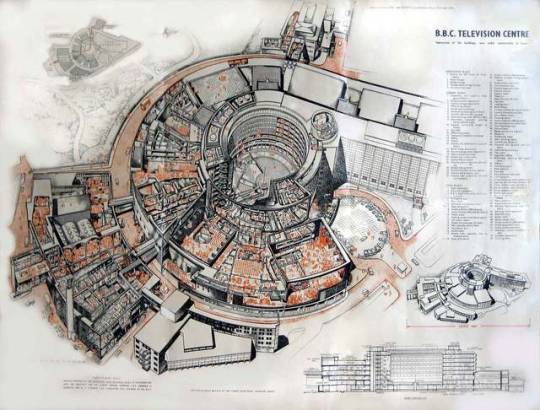
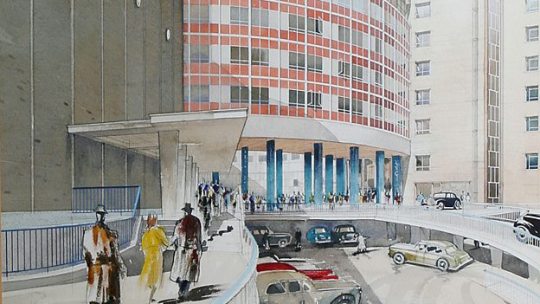
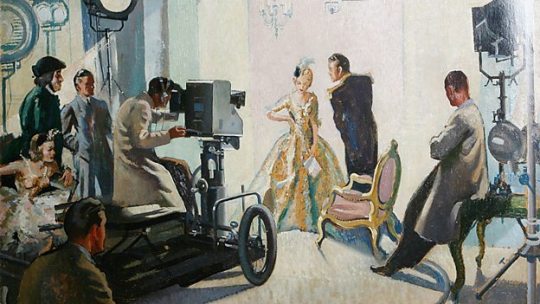
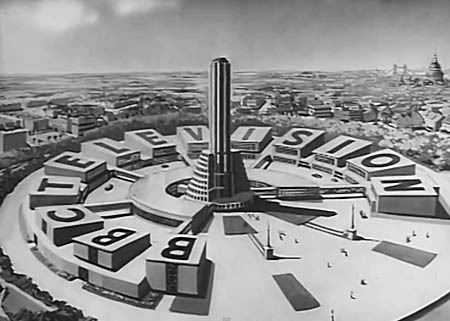
RIP BBC Television Centre
http://www.bbc.co.uk/historyofthebbc/collections/art/watercolour
http://www.tvstudiohistory.co.uk/tv%20centre%20history.htm
http://www.bbc.co.uk/historyofthebbc/collections/art/rehearsal
http://www.tvstudiohistory.co.uk/tvc%20cutaway%20page.htm
25 notes
·
View notes
Link
BBC Moved the link, they are now located here: https://www.bbc.com/historyofthebbc/100-voices/people-nation-empire/lgbtq/
anything that contains the phrase “secret BBC memo reveals” intrigues me automatically ngl but I want you all to know that as far as I can gather, the facts are even better than this headline
which is to say, this was part of an initiative in the early 1970s that not only featured marginalized groups on BBC programming, but made moves towards handing them editorial control – the BBC had to approve proposals, but after that, the station’s role was primarily to provide technical resources, facilities, and copyright handling. (another notable program under this initiative featured Black teachers discussing racism in the school system, and a link to that – plus discussion of the hurdles it faced – can be found here).
the program on trans experience was aired in 1973.
The programme, featuring trans women, began: “Jokes about ‘the operation’ are all that most people know about transexualism [sic]. Tonight’s group discuss their situation in a more serious and comprehensive way, and draw attention to the many difficulties they endure”.
you can watch Open Door: Transex Liberation Group here (as well as other archived LGBTQ programming from BBC).
89K notes
·
View notes
Link
New link, https://www.bbc.com/historyofthebbc/100-voices/people-nation-empire/lgbtq
anything that contains the phrase “secret BBC memo reveals” intrigues me automatically ngl but I want you all to know that as far as I can gather, the facts are even better than this headline
which is to say, this was part of an initiative in the early 1970s that not only featured marginalized groups on BBC programming, but made moves towards handing them editorial control – the BBC had to approve proposals, but after that, the station’s role was primarily to provide technical resources, facilities, and copyright handling. (another notable program under this initiative featured Black teachers discussing racism in the school system, and a link to that – plus discussion of the hurdles it faced – can be found here).
the program on trans experience was aired in 1973.
The programme, featuring trans women, began: “Jokes about ‘the operation’ are all that most people know about transexualism [sic]. Tonight’s group discuss their situation in a more serious and comprehensive way, and draw attention to the many difficulties they endure”.
you can watch Open Door: Transex Liberation Group here (as well as other archived LGBTQ programming from BBC).
89K notes
·
View notes
Link
Updated link: https://www.bbc.com/historyofthebbc/100-voices/people-nation-empire/lgbtq/ scroll halfway down the page, it's pretty obvious
anything that contains the phrase “secret BBC memo reveals” intrigues me automatically ngl but I want you all to know that as far as I can gather, the facts are even better than this headline
which is to say, this was part of an initiative in the early 1970s that not only featured marginalized groups on BBC programming, but made moves towards handing them editorial control – the BBC had to approve proposals, but after that, the station’s role was primarily to provide technical resources, facilities, and copyright handling. (another notable program under this initiative featured Black teachers discussing racism in the school system, and a link to that – plus discussion of the hurdles it faced – can be found here).
the program on trans experience was aired in 1973.
The programme, featuring trans women, began: “Jokes about ‘the operation’ are all that most people know about transexualism [sic]. Tonight’s group discuss their situation in a more serious and comprehensive way, and draw attention to the many difficulties they endure”.
you can watch Open Door: Transex Liberation Group here (as well as other archived LGBTQ programming from BBC).
89K notes
·
View notes
Link
here is a working link to the BBC programme about experiences of people in the LGBTQ community: https://www.bbc.com/historyofthebbc/100-voices/people-nation-empire/lgbtq/
(the other one was missing a forward slash at the end)
On the page there is the video box with the episode about transgender people: Open Door: Transex Liberation Group, BBC Two, Monday 4 June 1973, 23:25.
anything that contains the phrase “secret BBC memo reveals” intrigues me automatically ngl but I want you all to know that as far as I can gather, the facts are even better than this headline
which is to say, this was part of an initiative in the early 1970s that not only featured marginalized groups on BBC programming, but made moves towards handing them editorial control – the BBC had to approve proposals, but after that, the station’s role was primarily to provide technical resources, facilities, and copyright handling. (another notable program under this initiative featured Black teachers discussing racism in the school system, and a link to that – plus discussion of the hurdles it faced – can be found here).
the program on trans experience was aired in 1973.
The programme, featuring trans women, began: “Jokes about ‘the operation’ are all that most people know about transexualism [sic]. Tonight’s group discuss their situation in a more serious and comprehensive way, and draw attention to the many difficulties they endure”.
you can watch Open Door: Transex Liberation Group here (as well as other archived LGBTQ programming from BBC).
89K notes
·
View notes